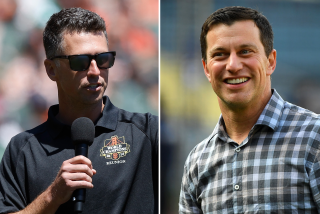Despite Brian Sabean’s reaction, Giants go on without Buster Posey
- Share via
When the Giants lost Buster Posey to injury last month, the (over)reaction of General Manager Brian Sabean made it seem as if the team’s pennant hopes hobbled off the field with its 2010 rookie-of-the-year catcher.
Which probably came as a surprise to the Giants’ other 24 players, who apparently have decided to play out the rest of the schedule anyway — especially since they’re still in first place and all.
But it got us to wondering: Is there really such a thing as an indispensable player, one so good and so valuable he can’t be replaced?
The answer from around baseball was a resounding “no.”
Followed by “yes” and “maybe.”
“It’s just like everything else,” said Pat Gillick, a Hall of Fame general manager whose teams won three World Series championships. “One player is more important than another. That’s all.
“I mean, all the players are important. But sometimes one player is more than the others.”
Casey Stengel, another Hall of Famer, certainly thought so. With the New York Mets’ first pick in the 1961 expansion draft, Stengel chose Hobie Landrith, a catcher who hit for neither average nor power.
But to Stengel he was invaluable.
“You gotta have a catcher,” Stengel said, “or you’re gonna have a lot of passed balls.”
Hard to argue with that.
But quantifying which players are most valuable is another story. Baseball historian John Thorn and sabermetrician Pete Palmer tried to do just that with something called the Linear Weights System, which measures runs contributed offensively, defensively and by pitchers.
Armed with that information, they were able to compare the impact of players across leagues and generations before arriving at a rather startling conclusion: that former Angels second baseman Bobby Grich was one of the most valuable players of all time.
“Absolutely,” Thorn said without hesitation. “Bobby Grich is the hero of sabermetricians. Nobody thought that he was as good as the numbers revealed he was.
“But good Lord! He was an outstanding defensive second baseman. He drew walks. He hit for power. He played every day.”
And, according to Thorn and Palmer’s calculations, three times he made more impact on the number of games his teams won than any other player in the American League.
“Nobody thought he was a star,” Thorn said of Grich, who averaged a very average .266 with 18 home runs and 70 runs batted in over 17 seasons.
It’s a common mistake to measure a player’s value by relying solely on old-school metrics. More important is how well-rounded a player’s contributions are in hitting, fielding and baserunning.
And does he play every day? Starting pitchers usually do more to impact the outcome of a game than anyone else, but they only play once or twice a week. So if the team gets by without them the other days, how indispensable can they be?
For Gillick, a special adviser for the Philadelphia Phillies and former GM for four teams, how irreplaceable a player is is often determined by those around him.
“If you have a replacement for that player that can at least give you the same results, same production, same level of play — if you have somebody like that, then it’s not a problem,” he said. “If you don’t have a replacement for that player, then it can be kind of devastating.”
For example, the Minnesota Twins couldn’t replace catcher Joe Mauer and now have the AL’s worst record. The AL West-leading Texas Rangers were six games under .500 without slugging outfielder Josh Hamilton. And the Angels, who went 109-84 with Kendrys Morales in the lineup in 2009-10, have gone 86-89 without him.
The St. Louis Cardinals, conversely, have led their division most of the season despite a slow start from Albert Pujols and the absence of 20-game winner Adam Wainwright.
“It’s an old cliche: Injuries are a part of the game. That’s what happens,” Gillick said. “When you’re constructing the team, you’ve got to try to cover as many spots as you can.”
Which brings us back to GM Sabean and the Giants. Their backup for Posey was Eli Whiteside, who is hitting .180, more than 100 points less than the guy he replaced. Yet the Giants are 6-3 this month without Posey.
“When you say irreplaceable, that’s pretty tough,” Tigers General Manager Dave Dombrowski said. “That means, by definition when you’re saying that, no matter what you’re done.
“There’s a lot of players that clubs can ill afford to lose. But that doesn’t mean that your season’s over when you lose them.”
More to Read
Go beyond the scoreboard
Get the latest on L.A.'s teams in the daily Sports Report newsletter.
You may occasionally receive promotional content from the Los Angeles Times.











